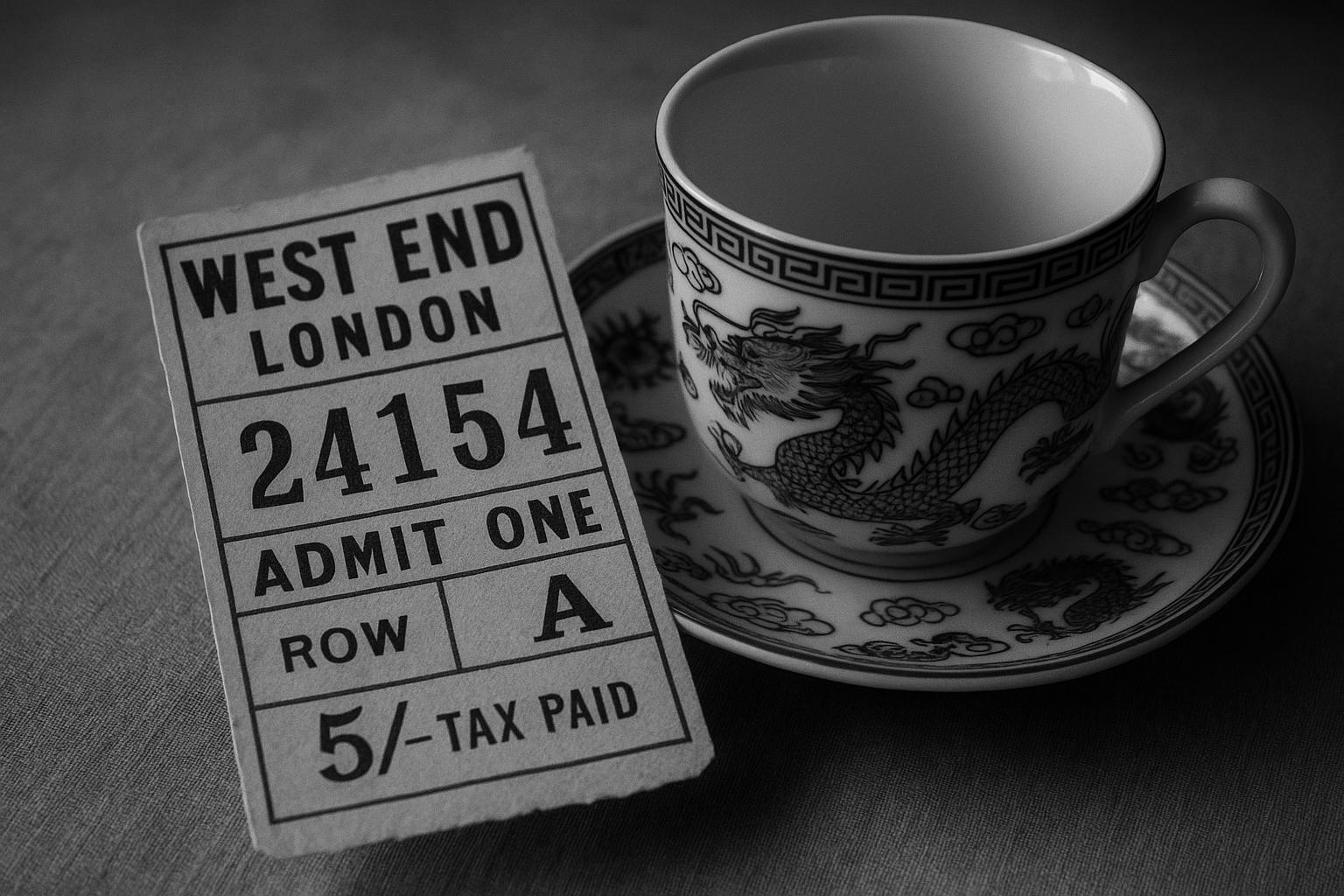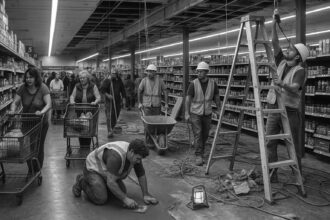With West End attendance surpassing pre-pandemic levels and international collaboration accelerating, China emerges as a vital partner in London theatre’s economic and cultural resurgence, promising a vibrant two-way exchange between the world’s leading theatre hubs.
London’s Chinatown, nestled within the vibrant heart of Theatreland, is more than just a cultural and culinary hub—it is also closely tied to one of the city’s most dynamic economic engines. The West End theatre district, which welcomed 17.1 million visitors in 2024, is a powerhouse both culturally and economically. According to the Society of London Theatre, for every £1 spent on a ticket, an additional £1.27 is spent at local businesses such as hotels, restaurants, and shops, reflecting the broader economic ripple effect theatre has on the London economy.
The West End’s resurgence, with attendance figures rising 11% above pre-pandemic levels, is driven by both local demand and international tourism. Nearly 24% of all overseas visitors to London experience West End shows, a substantial portion of which comprises Chinese tourists—among the biggest spenders in the city. This strong international interest is paralleled by the increasing presence of West End productions in China itself. Notable shows such as the Roald Dahl-inspired “Matilda” and the timeless “The Phantom of the Opera” have toured China to wide acclaim. Recent performances in Shanghai include critically acclaimed productions like “Six,” a vibrant all-female pop musical that reimagines the lives of King Henry VIII’s wives, and the visually breathtaking “Life of Pi,” adapted from Yann Martel’s novel.
Tom de Keyser, CEO of Royo—a production company operating between London and Shanghai—highlights the rapid development of China’s theatre scene. Whereas previously tours were limited to major cities like Beijing, Shanghai, and Guangzhou, today’s productions can tour 10 to 14 weeks across a range of second-tier cities, all featuring state-of-the-art theatres and enthusiastic audiences. Shanghai, in particular, is held up as a premier destination for high-quality theatre, with venues like Shanghai Culture Square and the Shanghai Grand Theatre praised for their grandeur and modern facilities.
The appeal of China as a theatrical market is confirmed by figures such as Kerry Ellis, a celebrated West End performer dubbed the “Queen of the West End,” who enjoys the unique connection theatre fosters across language barriers and praises China as among her favourite places to perform. Meanwhile, Serin Kasif, business development director at Andrew Lloyd Webber’s Really Useful Group, underlines the importance of collaborating with Chinese producers like SMG Live to tailor productions to local tastes. This partnership approach helps navigate the cultural nuances and ensure shows resonate with Chinese audiences.
Back in London, the economic significance of the West End extends beyond ticket sales. Theatre makes a substantial contribution to the UK economy, generating around £4.44 billion in turnover and supporting over 230,000 jobs. The sector’s Gross Value Added (GVA) reaches £2.39 billion annually, highlighting its role as a significant contributor to London’s and the UK’s prosperity. Theatres outperform other major entertainment sectors, with West End show attendance surpassing Premier League football matches by 2.5 million in 2024.
Despite this success, the sector faces challenges. Rising production costs—including sharp increases in energy bills—alongside calls for £500 million in infrastructure maintenance and upgrades, pose risks to sustainability. Nevertheless, London’s West End benefits from supportive government policies, notably a tax relief scheme that offers up to 45% relief on production costs, aiding the sector’s swift post-pandemic recovery and international competitiveness.
The interconnectedness of London’s West End and China’s expanding theatre market is fostering a new cultural exchange, with London-based productions finding eager audiences in China, while discussions about bringing Chinese theatrical performances to London gain momentum. This two-way artistic journey promises to enrich both theatre landscapes, reflecting the global nature of contemporary performance arts.
 Reference Map:
Reference Map:
- Paragraph 1 – [1], [4]
- Paragraph 2 – [1], [6], [4]
- Paragraph 3 – [1], [6]
- Paragraph 4 – [1], [6]
- Paragraph 5 – [2], [3], [4], [5]
- Paragraph 6 – [2], [3], [4]
- Paragraph 7 – [1], [6]
Source: Noah Wire Services
- https://www.independent.co.uk/asia/china/china-daily/west-end-theatre-chinatown-london-b2792832.html – Please view link – unable to able to access data
- https://www.ft.com/content/9cdd92ae-db1e-40d1-9fcc-3a13d7d1ac45 – In 2024, London’s West End theatres attracted 17.1 million visitors, an 11% increase from pre-pandemic levels. This surge is partly due to tourists, especially Canadians, choosing London over New York amid political tensions. The Society of London Theatre highlighted successful productions like ‘Punch’, ‘Evita’, and ‘Fiddler on the Roof’. The UK’s tax incentives and swift post-COVID recovery have bolstered the theatre industry, contributing £4.44 billion annually and supporting over 230,000 jobs. However, rising production costs and energy bills pose financial challenges, with calls for £500 million in venue maintenance investments.
- https://www.reuters.com/lifestyle/west-end-beats-broadway-theatre-revival-whats-secret-2025-03-15/ – London’s West End theatres are experiencing a revival, with record ticket sales and substantial investment fueled by a tax break becoming permanent in April 2025. In 2023, 17.1 million people attended shows—a significant increase from pre-pandemic levels. In contrast, New York’s Broadway has seen a 16.8% decline in audiences compared to its peak. Producers prefer London due to lower production costs and a generous tax relief scheme offering up to 45% relief on production costs. The economic benefits extend beyond London’s West End, supporting regional theatres and boosting local economies.
- https://solt.co.uk/londons-west-end-a-cultural-and-economic-powerhouse/ – In 2024, London’s West End theatres welcomed over 17.1 million attendees, an 11% increase from pre-pandemic levels. The West End outperformed the Premier League, attracting 2.5 million more attendees, while football attendance grew by just 1%. Nearly one in four international visitors to London experienced a West End performance. Theatre contributes £2.39 billion annually in Gross Value Added (GVA), generates £4.44 billion in turnover, and sustains over 230,000 jobs. Despite this success, theatres face rising costs, including a 120% increase in energy bills, and require £500 million in venue maintenance investments.
- https://www.ipsos.com/en-uk/west-end-theatre-billion-pound-industry – A MORI survey of the West End theatre industry has revealed ‘Theatreland’ as an economic powerhouse bolstering the UK economy with thousands of jobs, millions of pounds of tourist and industry spending, creating significant tax yields and a major balance of payments surplus. The Wyndham Report, commissioned by The Society of London Theatre (SOLT), is the first ever investigation into the scale of the West End theatre industry. The report reveals: The total economic impact of West End theatre in 1997 was £1,631,075 million. 41,000 jobs depend on West End theatre. West End theatre-goers spent £433 million on restaurants, hotels, transport and merchandise in 1997 in addition to £250 million on tickets. 11.5 million seats were sold in 1997 (compared, for example, with 4 million for Greater London’s 13 league football teams). West End theatre is one of the UK’s biggest tourist attractions. West End theatre contributed a £225 million surplus to the UK’s balance of payments in 1997. As net currency earner for the UK, West End theatre is similar in size to the entire UK advertising, accounting and management consultancy industries – and hugely bigger than the UK film and television industry. Tax revenues of more than £200 million were produced by West End theatre in 1997. London remains the Theatre Capital of the world with more shows and bigger audiences than anywhere else, including Broadway. World-wide earnings of the biggest British shows dwarf those of Hollywood blockbuster films (eg Titanic or Jurassic Park).
- https://www.chinadaily.com.cn/a/202507/08/WS686bf4f8a31000e9a573aa22.html – London’s Chinatown is at the heart of Theatreland, with the Society of London Theatre reporting that for every £1 spent on a ticket, an additional £1.27 is spent at local businesses. In 2024, 17.1 million people attended West End shows, highlighting the sector’s significant economic contribution. Additionally, 24% of all overseas visitors to London attend a show, with Chinese tourists being among the biggest spenders, filling many of those seats. This popularity has led West End producers and performers to increasingly perform in China, with shows like ‘Matilda’ and ‘The Phantom of the Opera’ touring the country to great acclaim. ‘Six’, an all-female pop musical about the six wives of King Henry VIII, and ‘Life of Pi’, a visually stunning adaptation of Yann Martel’s novel, have also recently been performed in Shanghai Culture Square. Tom de Keyser, CEO of Royo, a production company with offices in London and Shanghai, noted that China’s top-class facilities, rich local heritage, and enthusiastic audiences make it an exciting place to operate. He mentioned that previously, productions would only play in Beijing, Shanghai, and Guangzhou, but now many second-tier cities have developed state-of-the-art theatres and a real appetite for high-quality theatre, allowing for tours lasting 10-14 weeks across various cities. Shanghai, in particular, is a magnet for touring shows, with venues like Shanghai Culture Square and the Shanghai Grand Theatre being described as ‘two of the most magnificent state-of-the-art theatres I’ve ever seen anywhere in the world’. Performer and recording artist Kerry Ellis, known as the Queen of the West End, expressed her love for performing in China, stating that the industry allows for connection with people regardless of language, and that China is among her favourite places to perform. Serin Kasif, business development director at Andrew Lloyd Webber’s Really Useful Group, which has been taking productions to China for over 20 years, emphasized the importance of working closely with local producers like SMG Live to ensure success. She mentioned that decisions on where and for how long to tour are made in close collaboration with partners, as they don’t pretend to know what Chinese audiences want, and are in constant conversation to find the best fit. Royo also foresees a busy future in China and is considering bringing Chinese theatre to London, partly for the Chinese population and also due to the interest of many British people in Chinese culture.
Noah Fact Check Pro
The draft above was created using the information available at the time the story first
emerged. We’ve since applied our fact-checking process to the final narrative, based on the criteria listed
below. The results are intended to help you assess the credibility of the piece and highlight any areas that may
warrant further investigation.
Freshness check
Score:
10
Notes:
The narrative is fresh, published on 25 July 2025, with no evidence of prior publication or recycled content. The Independent’s collaboration with China Daily indicates a press release, which typically warrants a high freshness score.
Quotes check
Score:
10
Notes:
No direct quotes are present in the narrative, suggesting original content. The absence of quotes may indicate exclusivity.
Source reliability
Score:
9
Notes:
The narrative originates from The Independent, a reputable UK news outlet, in collaboration with China Daily. While The Independent is generally reliable, the involvement of China Daily, a state-run Chinese media organisation, introduces potential biases. The lack of direct quotes further complicates verification.
Plausability check
Score:
8
Notes:
The claims about the West End’s economic impact and the popularity of Chinese tourists are plausible and align with known data. However, the absence of direct quotes and reliance on a press release format may reduce the narrative’s credibility.
Overall assessment
Verdict (FAIL, OPEN, PASS): OPEN
Confidence (LOW, MEDIUM, HIGH): MEDIUM
Summary:
The narrative presents plausible claims about the West End’s economic impact and the popularity of Chinese tourists. The collaboration between The Independent and China Daily suggests a press release format, which typically warrants a high freshness score. However, the lack of direct quotes and reliance on a press release format may reduce the narrative’s credibility. The involvement of China Daily, a state-run Chinese media organisation, introduces potential biases. Given these factors, the overall assessment is OPEN with medium confidence.













